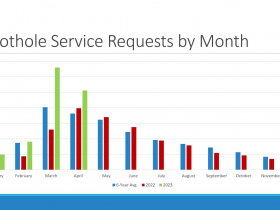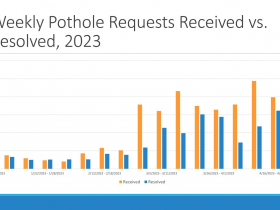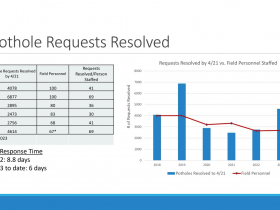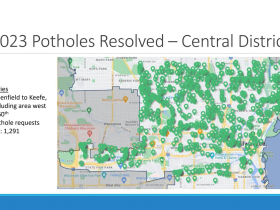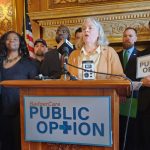Potholes Are A Hot Problem in Milwaukee
Council members frustrated as complaints mount.
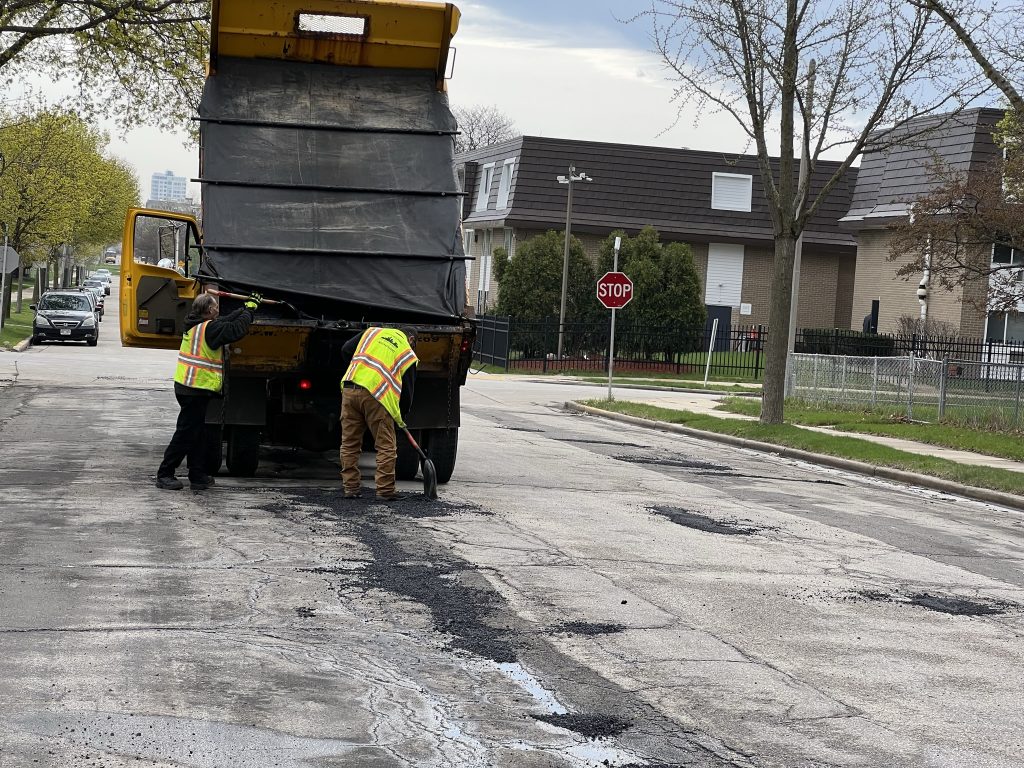
A Department of Public Works crew fills potholes by W. Juneau Ave. and N. 20th St. Photo by Jeramey Jannene.
It’s pothole season in the Midwest.
The repeated freeze-thaw cycle at the end of winter created ideal conditions for potholes to form.
“I get the weather, but is the weather different in West Allis, Greenfield?” asked Alderman Robert Bauman at Wednesday’s Public Works Committee.
Obviously not. But City Engineer Kevin Muhs and other Department of Public Works (DPW) officials said the city has additional issues: a backlog of streets waiting for replacement, short staffing and a timing issue with the availability of asphalt to fill potholes.
Two graphs from DPW highlight the issue. One, showing reported potholes by month, shows the March requests more than triple that of 2022 and nearly double the five-year average. April is also above both historical marks. The second graph shows, starting in February, that the city is receiving far more requests than it completes each week.
The city has a goal of filling a request within three days. “We are not hitting that goal,” said Muhs. Through April 21, the 2023 average is at six days.
“Every pothole that gets reported gets filled,” said Public Works Commissioner Jerrel Kruschke. They just don’t get filled as as quickly as anyone would like.
“My office is being pummeled with complaints,” said Bauman. Alderwoman JoCasta Zamarripa, who initiated the public hearing, said she has also received several complaints.
“They’re bad. They’re expensive. They’re dangerous. And they’re costing our constituents money,” said Pérez.
Issues Abound
A third graph from DPW shows that the department is using its personnel effectively. The average city laborer has closed 69 pothole-related service requests this year, the same number as they did at their peak in 2019. The difference is that there are far fewer laborers.
In 2018 and 2019 there were 100 street maintenance workers, but now there are 85 funded positions and only 67 positions are filled, a five-year low.
“When are we going to see that vacancy rate go down?” asked Common Council President José G. Pérez.
“I wish I had that answer,” said Kruschke. He said DPW has an average vacancy rate of 25%. A compensation analysis for the street maintenance positions is underway. Street services manager Tom Wangerin said a comparable job at the Milwaukee County Department of Transportation now pays an additional $3 per hour, leading to city workers job hopping.
For two reasons, the city can’t just throw more workers at the issue.
Kruschke said reassigning laborers from the street lighting team to fill potholes would result in those outages growing longer. Reassigning sanitation crews would result in missed pickups.
The city uses overtime on weekdays, but can’t fill any potholes on the weekend because the private asphalt plants are closed. The city used to have its own asphalt plant, but it was shuttered when the Harley-Davidson Museum replaced DPW’s Traser Yard in the Menomonee Valley.
“We could probably get an extra 10% to 20% out in a week,” said Muhs of weekend asphalt availability. Kruschke said DPW anticipates weekend availability starting in mid-May because private demand will then warrant the plants’ operation. For better or worse, the city’s pothole demand will have started to slow by then.
The use of hot mix asphalt is good news, spelling the seasonal end of the more expensive, more labor-intensive and far less effective cold patch mix. Because of the weather, hot mix is only available starting in mid-April, but potholes filled with it stay filled for years longer. Hot mix costs approximately $60 per ton, with the cold patch costing $120 per ton. Additionally, said Wangerin, workers get injured more often shoveling cold patch.
The National Avenue Issue
The public debate was spurred by the slow response to fill potholes on W. National Ave. Zamarripa’s office reported approximately 30 blocks worth of potholes on April 10, but they weren’t filled until April 24.
“I do feel that it took too long,” said the alderwoman.
DPW agrees.
“We do owe you and your constituents an apology,” said Muhs. He said DPW staff failed to properly analyze the severity of the issue. “There were outstanding requests as old March 22 that we should have gotten to.”
He attributed part of the issue to a work-order system that will be replaced after the seasonal spike. The new system, which is in testing said Muhs, is more efficient in several ways at managing the workflow of potholes.
There is another issue: where the potholes are. Following a 2019 incident, the city uses an additional truck when filling potholes on arterial streets like National Avenue to protect workers from being struck by passing vehicles. When there is a cluster of potholes on an arterial street, DPW tries to queue up multiple crews to better utilize the protective vehicle. But that comes at a cost of delaying when the potholes are actually filled.
National Avenue itself will be less of an issue when the city rebuilds the street with state support in the next two years. Similarly, the city’s $20 wheel tax has reduced the side-street replacement cycle by several decades, but Muhs noted a large backlog remains.
“There are hundreds of millions of dollars coming to replace these roadways. It’s just not instantaneous,” said Kruschke.
There is one additional glimmer of hope on the way in the form of pothole-filling machines. The city has one such truck currently, but Wangerin said it’s out of service due to an issue with its emulsion system. DPW anticipates returning it to service this summer and hopes to acquire more machines eventually.
But not every council member left happy with what they heard.
“I guess to warp this up and summarize, you’re doing the best you can, there are insurmountable problems, you’re going to continue to do the best you can, but not much is going to change,” said Bauman.
“I think everyone’s frustration here is understandable,” said Ald. Jonathan Brostoff. He said the issue was simply a reflection of the city’s much larger state-induced fiscal issues. “We need our fair share and everything else is commentary.”
DPW Slides
If you think stories like this are important, become a member of Urban Milwaukee and help support real, independent journalism. Plus you get some cool added benefits.
Political Contributions Tracker
Displaying political contributions between people mentioned in this story. Learn more.
- May 5, 2015 - José G. Pérez received $100 from JoCasta Zamarripa


